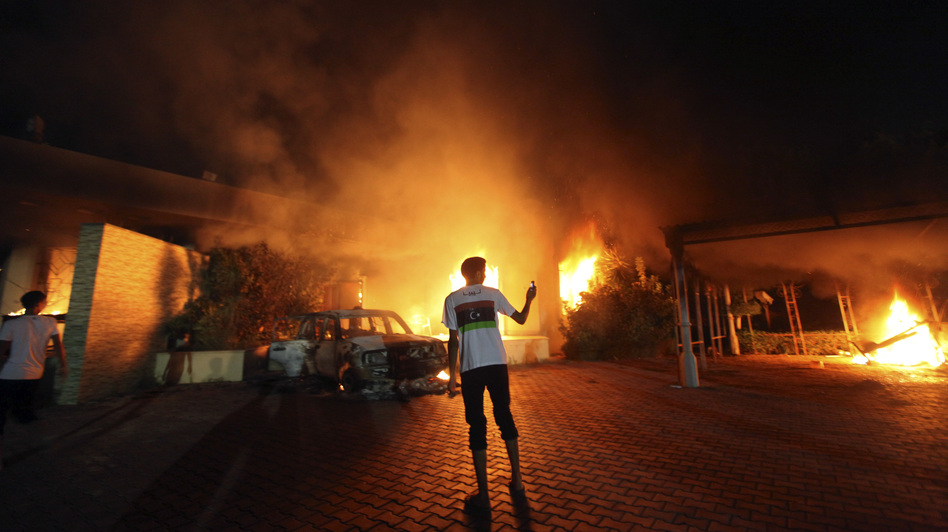August 16, 2013

Evidence that Egypt’s Muslim Brotherhood was directly involved in the September 11, 2012 terrorist attack on the U.S. consulate in Benghazi, where Americans including U.S. ambassador to Libya Chris Stevens were killed, continues to mount.
First, on June 26, 2013, I produced and partially translated what purported to be an internal Libyan governmental memo which was leaked and picked up by many Arabic websites. According to this document, the Muslim Brotherhood, including now ousted President Morsi, played a direct role in the Benghazi consulate attack. “Based on confessions derived from some of those arrested at the scene,” asserted the report, six people, “all of them Egyptians” from the jihad group Ansar al-Sharia (Supporters of Islamic Law), were arrested. During interrogations, these Egyptian jihadi cell members:
confessed to very serious and important information concerning the financial sources of the group and the planners of the event and the storming and burning of the U.S. consulate in Benghazi…. And among the more prominent figures whose names were mentioned by cell members during confessions were: Egyptian President Mohamed Morsi; preacher Safwat Hegazi; Saudi businessman Mansour Kadasa, owner of the satellite station, Al-Nas; Egyptian Sheikh Muhammad Hassan; former presidential candidate, Hazim Salih Abu Isma’il…
Four days after this memo appeared, the military-backed June 30 Egyptian revolution took place. Many of the Islamists in the Libyan document have either been arrested—includingSafwat Hegazi and Abu Isma’il—or have arrest warrants under terrorism charges.
Walid Shoebat followed up with some important investigative work concerning the Libyan document, including by documenting that Western sources had finally acknowledged that there is a group called Ansar al-Sharia operating in Egypt with a cell in Libya, and that, with the ouster of Muhammad Morsi, it (along with al-Qaeda) had declared jihad on Egypt’s military (not to mention regular civilians in general, and Coptic Christians in particular).
The fact is, days after the Benghazi attack back in September 2012, Muslim Brotherhood connections appeared. A video made during the consulate attack records people approaching the beleaguered U.S. compound; one of them yells to the besiegers in an Egyptian dialect, “Don’t shoot—Dr. Morsi sent us!” apparently a reference to the former Islamist president.
Most recently, on July 29, 2013, Ahmed Musa, a prominent Egyptian political insider and analyst made several assertions on Tahrir TV that further connected the dots. During his program, while berating U.S. ambassador Anne Patterson for her many pro-Brotherhood policies—policies that have earned her the hate and contempt of millions of Egyptians—Musa insisted that he had absolute knowledge that the murderer of Chris Stevens was Mohsin al-‘Azzazi, whose passport was found in Brotherhood leader Khairet al-Shatter’s home, when the latter was arrested. According to the firm assurances of political analyst Musa, ‘Azzazi is currently present in Raba‘a al-Adawiya, where he, the seasoned terrorist, is preparing to do what he does best—terrorize Egypt, just as the Brotherhood have promised, in revenge for the ousting of Morsi.
But why would Morsi and the Brotherhood attack the consulate in Libya in the first place? The day before the embassy attacks, based on little known but legitimate Arabic reports, I wrote an article titled “Jihadis Threaten to Burn U.S. Embassy in Cairo,” explaining how Islamists—including al-Qaeda—were threatening to attack the U.S. embassy in Cairo unless the notorious Blind Sheikh—an Islamist hero held in prison in the U.S. in connection to the first World Trade Center bombing—was released. The date September 11 was also deliberately chosen to attack the embassy to commemorate the “heroic” September 11, 2001 al-Qaeda strikes on America. (Regardless, the Obama administration, followed by the so-called mainstream media, portrayed the embassy attacks as unplanned reactions to an offensive movie.)
The theory is this: in order to negotiate the release of the Blind Sheikh, the Islamists needed an important American official to barter in exchange. And while the violence on U.S. embassiesbegan in Egypt, it seemed logical that kidnapping an American official from neighboring Libya would be less conspicuous than in Egypt, where Egyptians, including Morsi, were calling for the release of the Egyptian Blind Sheikh. Thus the U.S. consulate in Libya was attacked, Chris Stevens kidnapped, but in the botched attempt, instead of becoming a valuable hostage, he wound up dead.
Add to all this the fact that, despite the very serious charges filed against them—including inciting murder and terrorism, and grand treason—the Obama administration, first with Anne Patterson, and now with Senators John McCain and Lindsay Graham, keep pressuring Egypt to release Brotherhood leaders; McCain personally even visited the civilian al-Shatter, whose raided home revealed the passport of ‘Azzazi, whom Musa claims is the murderer of Stevens.
Needless to say, at this point, tens of millions of Egyptians are convinced that U.S. leadership is fully aware of the Brotherhood’s connection to Benghazi—and hence desperately pushing for the release of Brotherhood leadership, lest, when they are tried in Egypt’s courts, all these scandals become common knowledge.
Meanwhile in the United States, to a mainstream American public—conditioned as it is by a mainstream media—all of the above is just a “conspiracy theory,” since surely the U.S. government is transparent with the American people—except, that is, when it’s not.
Photo: Reuters
No comments:
Post a Comment